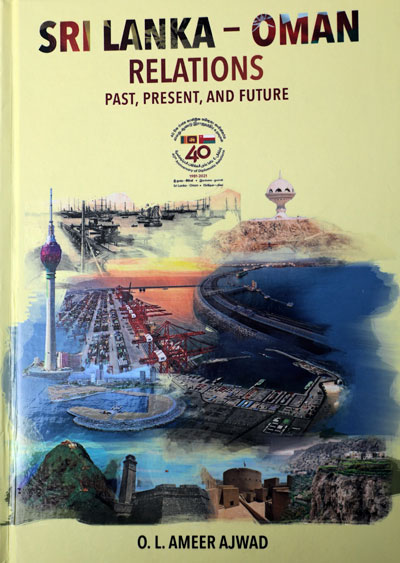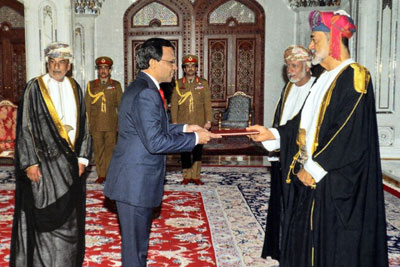Sunday Times 2
Oman-Lanka relations: From the mists of time to modern day and beyond
View(s):Seasoned diplomats would agree that diplomacy is all about stories. Some are to be told, some need to be cherished and some should be reinterpreted and retold.
Diplomats are good storytellers. They tell stories for a purpose, exclusively in the interest of their countries. In a sense, storytelling is part of diplomacy. This is why I believe the book career diplomat Omar Lebbe Ameer Ajwad has written is relevant. He says his objective is to reinvigorate the past, highlight the present and chart pathways for the future by providing relevant information with a view to fostering deeper economic engagement between the two nations.

Book facts: Sri Lanka-Oman relations: Past, Present and Future Author O.L. Ameer Ajwad Publisher: Black and White Media and Services, LLC, Oman
Published to mark the 40th anniversary of diplomatic relations between the two countries, the book titled Sri Lanka-Oman Relations: Past, Present, and Future’ tells a story that has its beginning in man’s conquest of the sea. With Sri Lanka and Oman being coastal states facing each other along a 3,000 km-long straight line on the Indian Ocean, contact between the two peoples naturally precedes recorded history.
To paraphrase what Oman’s Foreign Minister Bard Albusaidi has said Sri Lanka and Oman’s diplomatic journey may span just over four decades, but, the tales in the Lankan diplomat’s book show that bonds between the two countries go back centuries, if not millennia, into the mists of time.”
Author Ameer Ajwad, was Sri Lanka’s ambassador in Oman when the two countries marked the 40th anniversary of diplomatic relations. He takes the reader to the mists of time to pick the pieces of history and explain the time-tested relationship between Sri Lanka and Oman, the Arab world’s oldest independent state which owns an archeologically supported history of 100,000 years.
Shuttling between diplomacy and research, the author capsulizes the millennia-old ties between Sri Lanka and the Arab region in general and Oman in particular, providing a fascinating reading experience.
From the Silk Route and the Spice Route to the Omani halwa, a world-famous sweetmeat – even in Sri Lanka, a variety of sweet meat is called Muscat, Oman’s capital city – the book brings out the connectivity not only through age-old trade relations but also through cultural links between the two countries.
Just as the relations had been over the past centuries, even today the ties between the two countries keep growing on multiple fronts, with interdependency and people-to-people contacts being the common threads that define the bilateral relations. One of the key areas of interdependency is labour, with Sri Lanka being a labour-exporting country and Oman a labour-importing country. Then there are sports, trade, business and several other areas where ties remain bullish.
Besides, relations between the two countries are being further cemented by camaraderie in forums such as the Indian Ocean Rim Association (IORA), the Indian Ocean Marine Affairs Cooperation (IOMAC) and the Non-Aligned Movement.
Not many people know that the first Inspector General of Police and Customs of the Sultanate of Oman was a Sri Lankan. He was Felix de Silva, highly respected by the Omanis. He passed away in 2001 in the United States at the age of 74. The book explains how Mr. de Silva built up the Omani police force to be one of the best in the region, if not the world. It also contains notes on other famous Sri Lankans in Oman.
Structured on easy reading chapters supported by footnotes and photographs, some with captions and some without, the book also doubles up as an investor’s guide as it speaks of opportunities available for the business communities in Oman and Sri Lanka. Pointing to the growing momentum in public-and-private sector interactions between the two countries, Chapter V, especially, sheds light on some resultant success stories and unfolding opportunities that could bolster economic cooperation between the two countries.
Ambassador Ameer Ajwad should be hailed for publishing a valuable handbook on Sri Lanka-Oman relations. As he rightly points out, the book will certainly give an impetus to efforts to take the already time-tested relations between the two countries to the next level and greater heights.
Ameen Izzadeen

Ambassador Ameer Ajwad presenting his credentials to Oman's ruler Sultan Haitham bin Tariq

